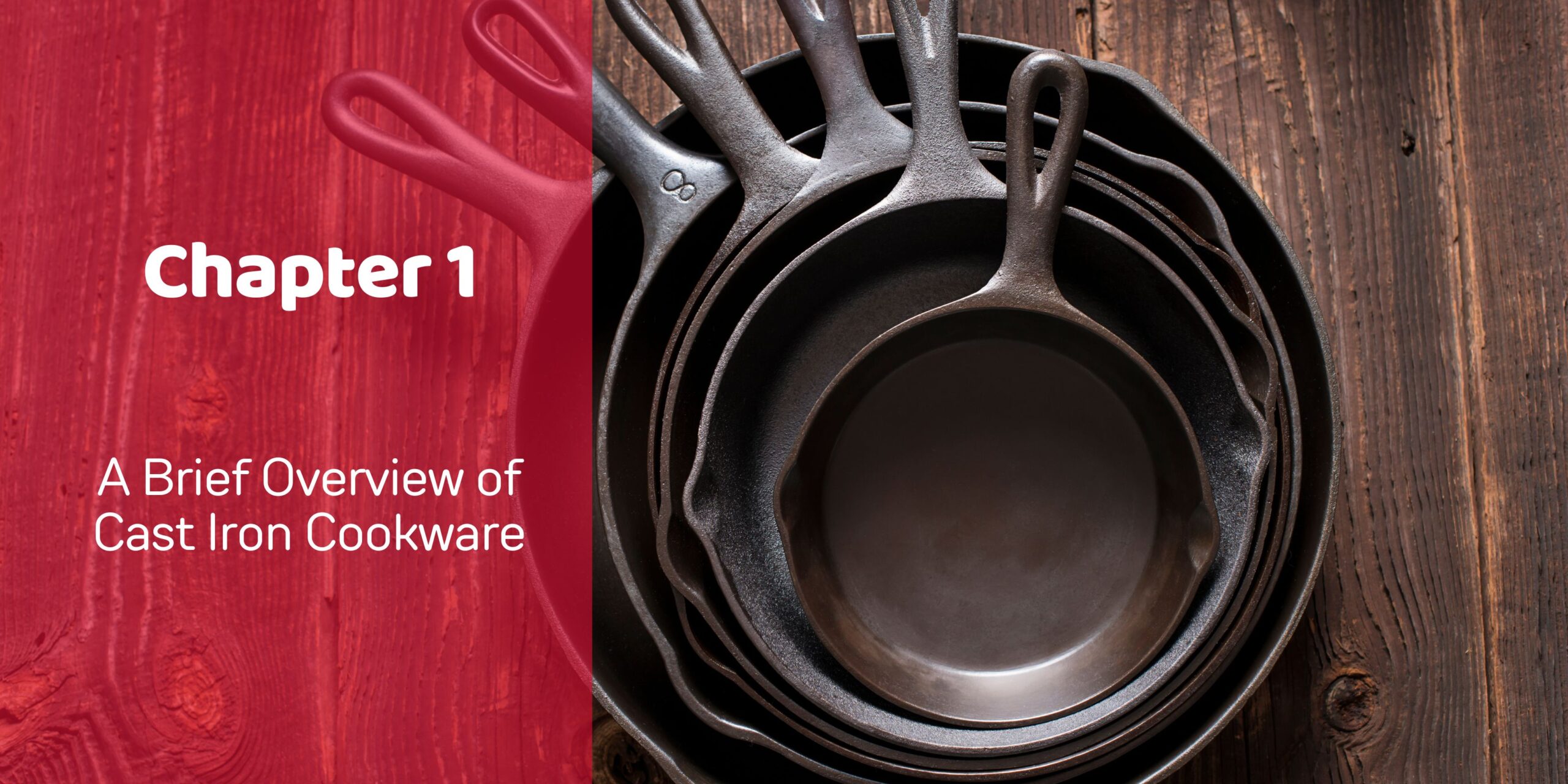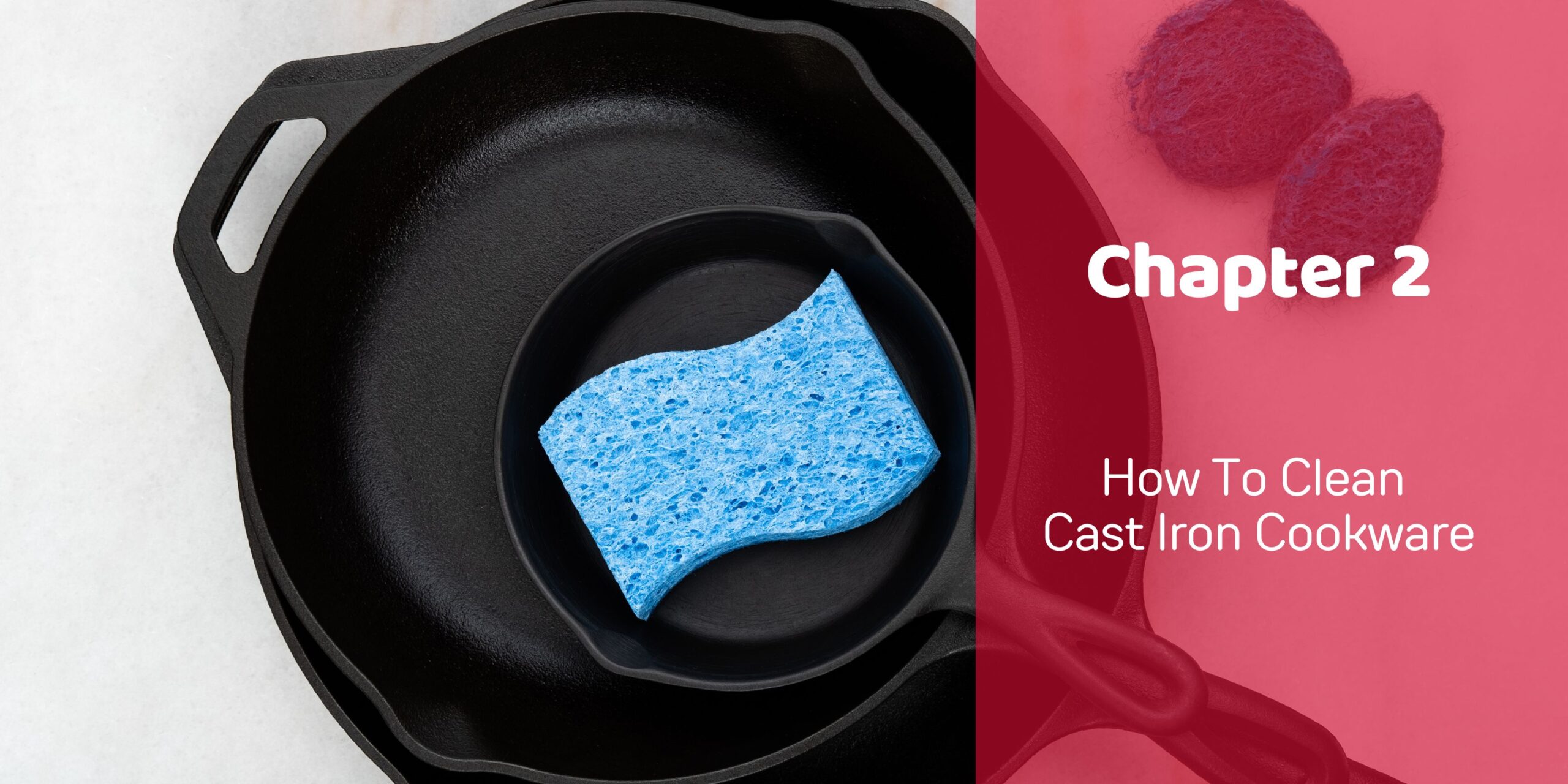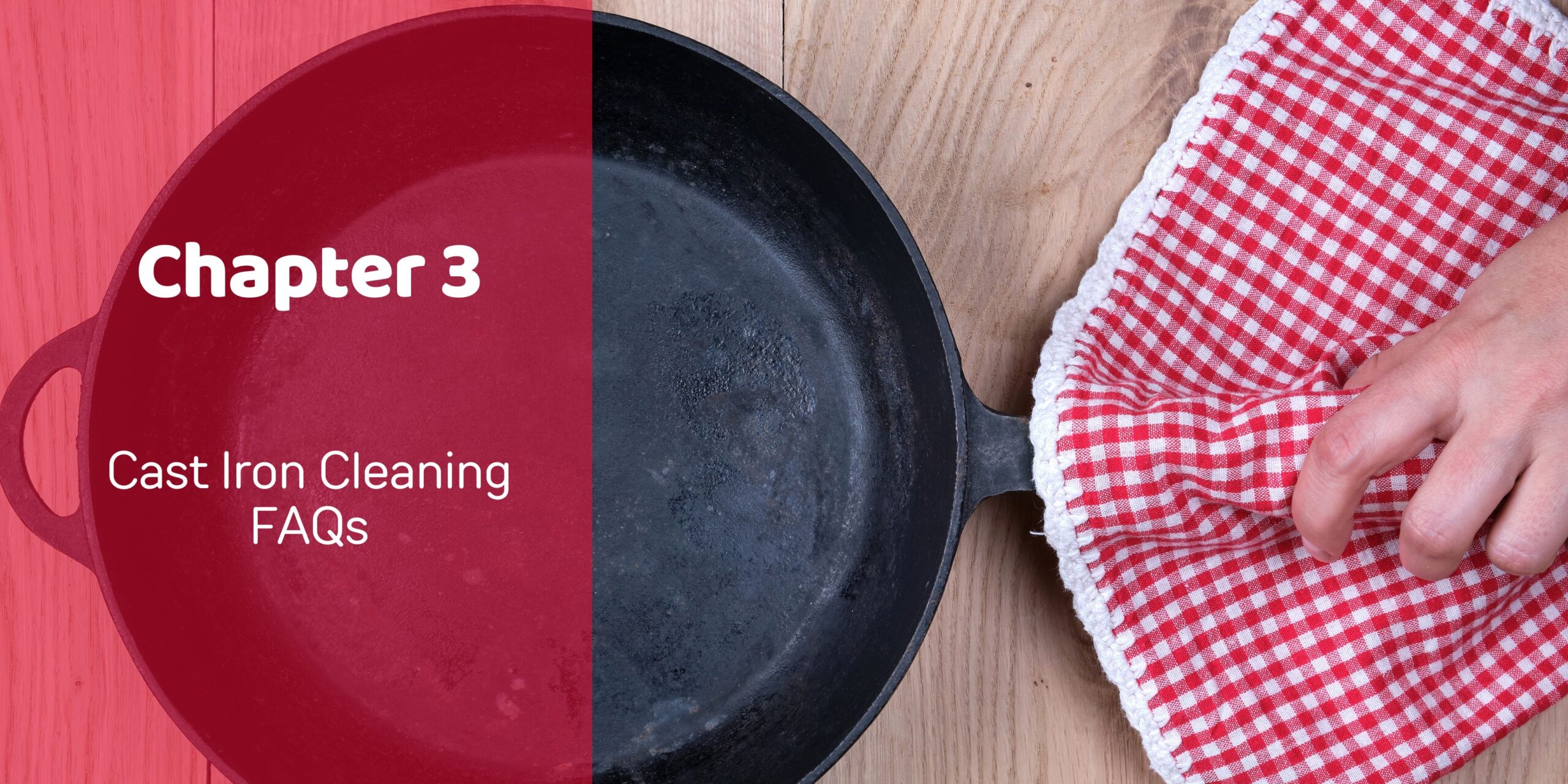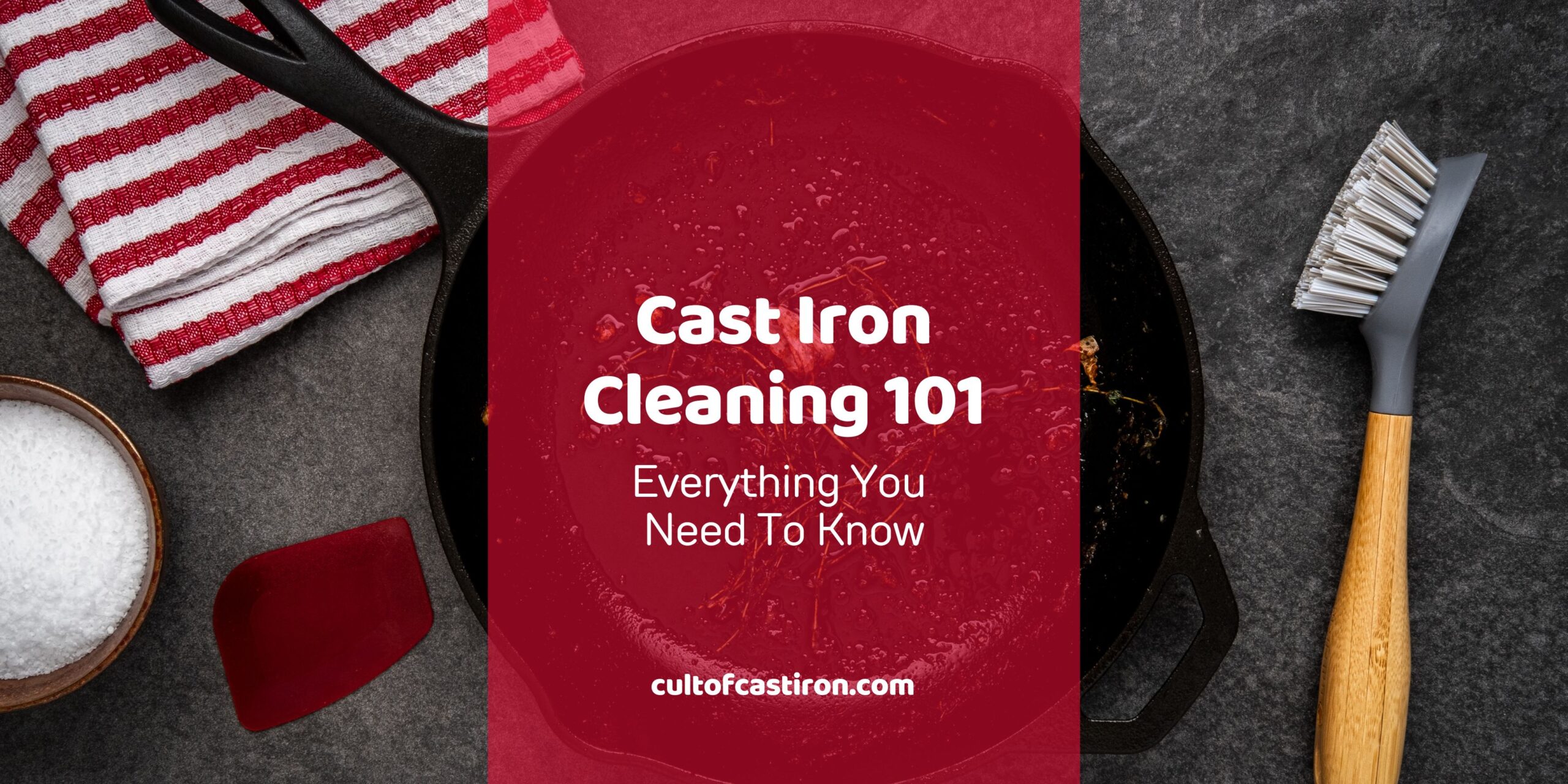Cast iron cookware have a reputation for being finicky and hard to maintain. Moreover, some people even consider them as unsanitary due to the misunderstanding that you never ever wash a cast iron pan as this could lead to the seasoning being ruined.
I say humbug! While the method of cleaning and maintaining a cast iron pan is certainly different than that of other types of cookware, the steps are not really hard or as time-consuming as most people would have you believe. I made this blog post to demystify as much of the cast iron cleaning process as I can.
Part 1: A Brief Overview of Cast Iron Cookware

To get a better understanding of why we clean cast iron cookwares a certain way, let’s start with the basics first.
What is cast iron cookware made of?
Cast iron cookware are mostly made out of gray cast iron, along with other constituents like carbon, silicon, and other trace materials. Do note that there are two general types of cast iron cookware available in the market: unenameled and enameled cast iron. For the most part, we are going to talk about the unenameled variants in this article.
Does cast iron rust?
Yes, cast iron does rust when exposed to moisture. Since iron is hydrophilic, its atoms are attracted to water molecules and react to them when they come in contact. This reaction forms iron oxide – otherwise known as rust.
Cast iron can easily rust when soaked in water for a long time. Moreover, even too much humidity can cause surface rusting when the cookware has been exposed for a significant amount of time. (chew on this for a moment).
To prevent this from happening, cast iron cookware are coated with a substance that repels water. This comes in the form of the polymerized layer of oil called the seasoning.
How does cast iron seasoning work?
The cast iron pan’s seasoning is made from a polymerized layer of oil that are bonded to the bare metal of the cast iron pan. This layer prevents moisture from seeping in to the metal below, and also provides a slick surface to cook on.
Now, on to the crux of the matter. Most people prize the smoothness of their cast iron cookware’s seasoning. Unfortunately, the seasoning can be ruined due to improper cleaning methods, and thus many people are discouraged to wash their pans and just use a paper towel to wipe off most of the debris on the pan.
While wiping bits of food off the pan is a viable way to clean lightly used pans, it should not be relied upon when cleaning really dirty pans, especially if food residue is stuck on its surface. The next sections will outline the proper method of cleaning a cast iron pan without ruining its seasoning.
Part 2: How To Clean Cast Iron Cookware

Cleaning cast iron pans are easier than you think. However, one wrong move may ruin its seasoning. Here are the basic steps on how to clean a cast iron pan the right way.
7 Steps to Clean Cast Iron Cookware
While these steps are certainly more complicated than washing with sponge, water, and soap, the process is quite simple and would not take you more than 5 minutes. Here they are in order.
1. Rinse the dirty pan in running water
First, you should remove most of the excess oil and loose food debris on the pan to make cleaning less messy. Placing the pan under running water should be enough to dislodge most of these residue off your pan.
2. Use a scrubber to remove stuck-on food
After that, get a scrubber or a stiff brush to loosen the bits of food that are stuck on the surface of the pan. If the residue is particularly stubborn, I putting hot water on the pan to loosen these bits off the surface, then scraping them off with a wooden spatula.
Sometimes, I lather the surface with soap to help me clean the pan. Don’t worry though, this is not likely to ruin your seasoning, as we will discuss later in this article.
3. Rinse and pat dry
Once you’ve scrubbed off the burned food on the surface, rinse the pan with running water until no particles are left on its surface.
At this point, you should also wipe off the excess moisture off the pan with a dish towel in preparation for the next step.
4. Heat the pan on the burner until it is bone dry
To ensure that the pan is completely dry, you should heat it on a burner for a few minutes until it looks dull and it starts to smoke. Take note: the pan may emit steam in the first few seconds of heating, so be careful with mistaking this for smoke.
5. Apply oil to the surfaces of the pan
Once the pan is completely dry, rub your choice of cooking oil on every surface of the pan. Make sure to get to the handles and the under side as well.
6. Wipe away excess oil with a rag
After oiling your pan, you must now wipe off the excess oil with a rag to prevent it from forming a sticky black residue later on. Remember: you only need a thin film of oil to protect the pan, so wipe away liberally as all of the oil that should be on there is likely already stuck on there.
You’ll know you’re done if the pan is shining but does not look wet.
7. Store the pan in a dry place
Believe it or not, that is all there is to it! You can now store the pan in a dry place. Choose one that does not have high humidity as this can cause surface rust if stored for a long time.
Part 3: Cast Iron Cleaning FAQs

As you’ve seen, cleaning a cast iron pan is quite easy. However, some of you might have additional questions regarding things that you may have read online, or a rule of thumb that a little bird told you. I did my best to compile and answer the most common questions regarding cleaning cast iron cookware in the section below.
Do you need to clean cast iron pans after every use?
Yes, you should definetely clean a cast iron pan after every time you use it. In fact, the best time to clean it is right after using it as it is easier to get rid of food residue while the pan is still hot. However, if the pan has been used very lightly, like, say, frying hotdogs, then wiping the surface with a paper towel should do the job.
Can I soak my cast iron pan in water?
As much as possible, don’t soak your cast iron pan in water for a significant amount of time. Cast iron is porous, and letting water come in contact with the pan for a long time will present many opportunities for water molecules to find its way inside the pores of the pan. In other words, you will be dealing with a lot more than just surface rust should water reach the interior of the pan.
Can you clean cast iron cookware with soap?
Yes, you can clean cast iron pans with soap without having a severe adverse effect on the pan’s seasoning. Just make sure you use it in moderation and rinse the pan off thoroughly after cleaning.
The “you can’t clean cast iron with soap” myth was made popular due to the ubiquity of harsh lye-based soaps that strips the seasoning layer from cast iron cookware back in the day. Thankfully, the dish soaps we have now are a lot milder and less likely to damage your pan. However, the same cannot be said for specialty soaps used for automatic dishwasher, as we will discuss later.
Is cooking with cast iron sanitary even if it was not washed with soap?
Yes, cast iron cookware is sanitary when cleaned and maintained properly – even without soap. This is because the heat from the drying process and during reheating before use are likely to kill most of the bacteria on the pan – thus sanitizing the pan.
Can you clean cast iron with salt?
Yes, cleaning a cast iron pan with salt is not likely to present problems for your pan’s seasoning. The salt acts as a mild abrasive that helps remove burnt bits and excess oil residue on the surface.
Do note that the abrasiveness of the salt may remove some of the seasoning from the pan, but keep in mind that it only happens if the seasoning is already peeling and in poor condition.
Can you clean cast iron with baking soda?
Yes, baking soda is a safe substance to clean a cast iron pan with. It acts as a mild abrasive, just like salt, to help you remove stubborn bits of burnt food stuck on the pan. Its deodorizing properties also absorb unwanted odors on the pan, if that is a problem that you are having.
Do note though that baking soda does not sanitize your pan. In fact, it does not have any innate antimicrobial properties to speak of. So don’t sprinkle baking soda in a misguided attempt to sanitize your pan.
Can you clean cast iron with vinegar?
Vinegar can damage the seasoning of your cast iron pan. However, it does have its uses. For example, it can be used to remove surface rust from rusted cast iron pans. Keep in mind though that this also removes bits of seasoning in the process, so reserve this as a nuclear option if you want to start your seasoning off from scratch, or if you are restoring a vintage cast iron pan.
Can you clean cast iron with baking soda AND vinegar?
Scrubbing your cast iron pan with a paste made from baking soda and vinegar is a great way to take off particularly stubborn food residue. The vinegar also does a great job at sanitizing the pan, while the baking soda deodorizes unwanted odors. Just keep in mind that the vinegar may damage the pan’s seasoning. But don’t worry – the worst case scenario that might happen is that you’ll have to reseason the pan.
Can you clean cast iron with bleach?
In the world of cast iron cooking, bleach is often used for enameled cast iron cookware to remove discolorations and stains. You can probably use bleach to clean unenameled cast iron pans – but it’s a bit overkill don’t you think?
Can you put cast iron cookware in the dishwasher?
No, you should not put your cast iron cookware in the dishwasher – and it is not because of the water. See, specialty dishwasher detergent are significantly harsher than dishsoaps, and it can strip off the seasoning from your pan. Stick to handwashing for this one.
How do I clean enameled cast iron cookware?
Enameled cast iron cookware can be cleaned with regular dishsoap and sponge. However, it is best if you towel dry it, and in some cases, heat it on a stove, to ensure that it is dry upon storage to prevent rusting,
Also, depending on the quality of the cookware, the rim may not be coated with enamel, hence it may provide a beachhead for rust to settle in. I always lightly oil the rims of my enameled double dutch oven to prevent this.
What do I do if my cast iron pan gets rusted?
Rusting on cast iron cookware is inevitable, and new pans with underdeveloped seasoning are particularly susceptible. Minor surface rust can be fixed just by scraping the rust particles off and applying oil as usual. More severe forms of rust may require a full blown restoration project that entails stripping everything off the pan – including the seasoning, and starting off from scratch.
Be a seasoned cast iron cookware user
With proper cleaning and maintenance, cast iron cookware can last for the years to come. Whether you’re a seasoned cast iron cook or new to the game, understanding the basics of cast iron cleaning is key to getting the most out of your cookware.
If you’re still hungry for more info about cast iron and other cookware made from carbon steel, stainless steel, copper, and aluminum, then be sure to check out the rest of the Cult of Cast Iron blog!

Miguel is a cast iron enthusiast from Cavite, Philippines. He works in the digital marketing field as a content marketing strategist. On the side, he manages a small online bookstore and tends to his plants.

